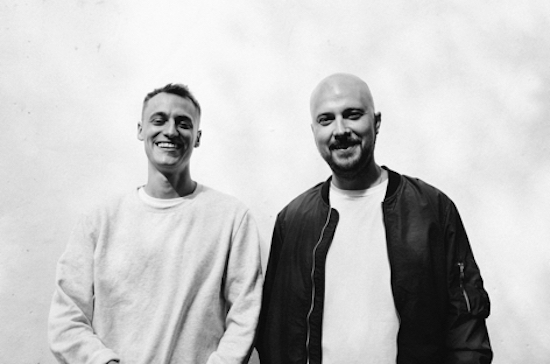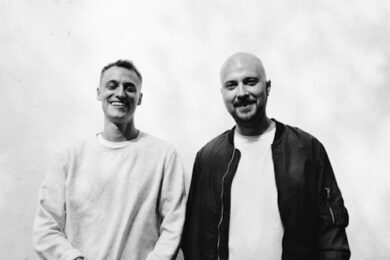“We were driving down to our mum’s one evening and it suddenly just hit us that we should start properly making music together,” Ed Russell, otherwise known as Tessela and one half of Overmono, tells me over a bowl of noodle broth in Soho. “That sounds strange, but we’d never written music together for our own enjoyment outside of a specific brief.” What followed was a five-day writing session in a cottage away from the distractions of city life in London, freeing up Ed and brother Tom, otherwise known as Truss and the other half of Overmono, to work completely independently, free of record label expectations and outside of their respective solo projects.
Tom is 10 years Ed’s senior, and the brotherly partnership between the two so far appears to have been void of any disputes over the course of their time in the studio together. They previously, though accidentally, established an improvisational live techno project known as TR\ER for a run of shows across 2013 and 2014, putting out just one release on a label called Brothers in 2012. In fact, Ed admits during our conversation that he actually finds it impossible to write music with anyone else, going on to tell me that he has tried to do so on one or two occasions, before Tom cuts him off mid-sentence: “You can be pretty stubborn.”
Having emerged from some fruitful early studio sessions, which gave the pair the chance to simply experiment away from what might be expected from their club-focused output, they eventually struck up a deal with XL. Now, two EPs later, and with a further EP and later an album on the way, they’ve decided to set other projects on the back-burner.
Their latest record, Arla II, sees the pair draw on refracted, big room-indebted trance and the kind of ‘90s rave that has been a particularly heavy influence on the younger Russell brother’s output over the years. Tracks such as ‘O-Coast’ and ‘Powder Dry’ mark out the pair’s ability to craft music together that draws on their own solo discographies while also adding a further dimension that doesn’t necessarily adhere to the often conservative expectations of techno and ‘club music’.
The pair are in high moods as we meet to speak over lunch, covering their early relationship with techno, the shift from TR\ER to Overmono, and their unorthodox approach to sampling amongst other subjects.
Listening to you both DJ, be it together or individually, I feel like there’s a strong lineage of faster, harder ‘90s techno running through it all, which differs somewhat to the more widely heard techno of today, with labels like Tresor and Djax-Up-Beats figuring heavily amongst the music you play out.
Tom Russell: I suppose some of my first introduction to the harder techno was stuff like Producer and others like Stu Allan and Carl Cox. This was around the early 1990s and I was listening to that along with some of the stuff emerging from Berlin and labels like Downwards, as well as, as you say, Tresor and Djax-Up-Beats. That was all in a somewhat different world to the techno that I had been listening to before.
Ed Russell: For me, I was probably listening to stuff like that when I was around 8, and Tom was 18 when he got his decks and was playing that music around me. I’m not sure if it made too much of an impression immediately, but I got some turntables when I was around 11 and the only records I was mixing with were ones that I was pinching from Tom’s room. I can’t remember any specific records and I wish I could, but I guess some of it would have been that faster, harder techno. I guess I went back and discovered it all retrospectively, especially with UK rave music in general.
Particularly in your music as Tessela, Ed, ‘90s rave culture has obviously been a strong reference point with regards to the hardcore and breakbeat of that time. Is that something that you’ve looked to incorporate into Overmono, or has that happened unconsciously perhaps?
ER: It’s something that definitely folded into Overmono but we didn’t set out to do so. Part of it would come down to the box of records Tom got when we first started writing for Overmono.
TR: My brother-in-law was a DJ in Leeds back in the late ‘80s and early ‘90s and he had tons of vinyl that had been gathering dust for a number of years down in a cellar, and he said that I could check it out to see if there’s anything that I might want. The first box we checked out had loads of amazing early Detroit stuff like Underground Resistance and Transmat records inside, and it was like ‘oh my god, this is amazing, I’ll take the lot’, and he wanted to get rid of them so he was fine with that. Then I got them all home and it was just a total letdown because I’d discovered all these records in this one box but then all the others were just not the same at all. There was a lot of UK stuff that I couldn’t even tell if they made it to official press because a lot of them were promos.
A lot of it is really bad, but we decided that we would just spend some time at the start of the project going through all these records and just pulling samples out, like drum loops, breaks, synths and whatever else we fancied. We built up a big library of sounds we thought were interesting, and that was almost the start of Overmono. We just almost exclusively used these samples to make the basis of some tracks.
ER: It was quite nice having a starting point like that.
TR: It was a totally different way of working for me at least, because I’ve never really used sampling very much in my work before.
Did any of that library find its way into the finished Overmono recordings then?
ER: There’s quite a lot that we’ve used, especially in the first record. Most of it we tried to obscure beyond recognition just to avoid any issues, so nobody should be able to find out what it is.
TR: People will probably try hard to find out now.
ER: There were one or two that we did have to clear or re-record. I think, more generally, because I wasn’t around to experience ‘90s rave culture first-hand because I was too young at the time, it feels more for me like I’ve somehow gained some sense of ownership because it is still what I’ve come from and what I’ve grown up with. For me it feels much more natural to take influence from ‘90s UK rave culture than making disco records or something, because it wouldn’t feel authentic at all. Obviously early rave records were doing stuff like that in that they were speeding up parts of early hip-hop records or whatever, so that’s not to say that you have to always have some ownership over what it is you’re producing, but for me it feels that I can go through and take influence from this big archive of samples we have, and have it still feel genuine.
Why did you start afresh with Overmono rather than perhaps continuing with the TR\ER project?
TR: I guess we don’t specifically see Overmono as a solely techno-focused project. TR\ER was more techno-focused and that project just came about without us really intending it to. A promoter from Ireland wanted to book us to do a live project and then that led to some further bookings and it spiralled a little from there.
ER: A friend of ours started a label called Brothers and asked if we could contribute a track to it and that was the only TR\ER track that we wrote. We never decided to start that project but it just carried on for a while, but we both knew that wasn’t what we wanted to do together in terms of musical output, I guess because it felt too similar to what we were doing on our own already. We liked the idea of having an outlet for all the other ideas that might get squeezed out of your solo work. Your influences get narrower and narrower as your sound develops and you grow more accustomed to the way you work, and in a way that’s really nice because you feel more comfortable writing and can carve out your own niche. At the same time though, you might find that you can’t work in some other ideas or they get pushed out, and doing Overmono means we can entertain those ideas and see if they can work in other ways. The two records we’ve put out so far, we’ve been able to work on without being limited to this idea of whether other people can play them out in clubs.
Have you brought ideas that you were working on individually before into the fold for further work with Overmono?
ER: Not too much from before, but there is something that Tom wrote around 10 years ago that I think is absolutely amazing. We tried working it into something recently and spent around a month going around in circles until we finally accepted it wasn’t working.
Why was that?
TR: I just don’t think it’s particularly as amazing as Ed thinks.
ER: It’s good, but it’s very big room.
Listening to something like ‘O-Coast’, I hear quite a trance-y, big room element to it even if it doesn’t fall into other obvious big room traditions. That doesn’t have to be a bad thing of course.
TR: Yes, especially with trance. We both love a bit of trance – it’s become such a dirty word. We love melodic stuff and there’s a huge amount of great stuff. Obviously there was a time where techno and trance were on very similar wavelengths and they’ve both crossed over into our work. As for ‘big room’, I guess a lot of my records as Truss are made to be played at big raves.
You’ve been co-running Poly Kicks, so in terms of working with XL on Overmono, was it the case that that gave you the chance to think bigger?
ER: When we started the project, there was a five-day writing session in a cottage. We did that independently. We decided it would be a good idea to book out this cottage in South Wales and we took down as much kit with us as we could. We broke down on the way and spent a night in Newbury so we only had three days there. We just made music day and night with no phone, no internet reception. There were no distractions and I think we came out with around 15 tracks. I guess that comes back to having your solo focus narrowed over time, and then we had all these possibilities working together.
TR: We weren’t writing for a label or with any other considerations apart from just doing what we wanted to do.
ER: You’re always chasing that feeling of hitting on a good idea. You feel so uplifted. We did it as just an enjoyable writing experience without boundaries and it was really free and easy. Once we had the music we didn’t know what to do with it. We thought Poly Kicks wouldn’t be the right place because it’s very much focused on 12”s and playable, club-focused records. XL was top of our list really.
TR: It felt it would be the best fit.
It’s my understanding that you’re in the process of working towards an album, so how’s that coming along?
ER: I’ve been reading quite a lot and making notes in preparation for the album, gathering thoughts and ideas. We need to set some boundaries before we start writing, so we’re trying to create some sort of manifesto I guess within which to work.
TR: As liberating as it is to have all those possibilities, it can also be a hindrance, whether it’s the techniques we use or the equipment.
Would you say the process of working together has come more naturally as the years have passed?
TR: I think it’s always been really easy right from the off.
ER: I find it pretty much impossible to make music with anyone else actually. I’ve tried a few times with friends…
TR: You can be pretty stubborn.
ER: I can be. I’m a bit of a megalomaniac as well so I find it hard to relinquish control sometimes, but that works better if you’re brothers rather than if you’re mates. You’re less bothered about writing something with somebody and being scared of their reaction. If we don’t like each other’s ideas, we can take criticism.
TR: Neither of us hold back really when we don’t like something or think something should be improved. There will always be times when one of us feels strongly about something and the other feels the opposite and it’s of course about trying to find some kind of compromise there to make you both happy. It doesn’t really often happen though. We’re on the same wavelength for the most part.
ER: If we’re not both into something, there’s probably a reason why. There’s a track we’re working on at the moment where Tom thinks the synth line sounds like an awful, distorted electric guitar-based drum & bass record. I can’t remember who it’s by.
TR: I probably shouldn’t say really.
Do you want to draw out silly elements in what you do though? For example, Tom, your work as Blacknecks definitely didn’t take itself seriously.
TR: Yeah, we both definitely like stuff that doesn’t take itself too seriously. I think some of our favourite music has a certain tongue-in-cheek element about it, but doesn’t cross too far over the line. Blacknecks I think was very borderline – maybe a few times we went over the line, but that was the nature of the project. With Overmono, it might just be a sample we use where only we know the source of it, but nobody else does, so it’s something for us.
ER: Some of the samples are pretty outlandish and I don’t think we should give away where they come from.
TR: We’re both big fans of Aphex for example, and one of the things I love most about Aphex is the humour in everything he does.
Arla II is out now on XL. Overmono play live at Field Day on June 3. For tickets and more information, click here




